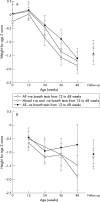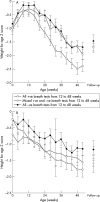Early Helicobacter pylori colonisation: the association with growth faltering in The Gambia
- PMID: 15557054
- PMCID: PMC1719757
- DOI: 10.1136/adc.2002.015313
Early Helicobacter pylori colonisation: the association with growth faltering in The Gambia
Abstract
Background: Helicobacter pylori is one of the commonest causes of chronic infection of mankind, yet the natural history of acute infection is poorly understood. Some studies suggest that gastric colonisation with H pylori is associated with suboptimal nutrition and growth in childhood.
Aims: To describe the clinical features of early H pylori colonisation and assess its role in the development of infant malnutrition and growth faltering.
Methods: Two consecutive prospective longitudinal cohort studies were conducted at the Medical Research Council Laboratories in a rural community in The Gambia, West Africa. The first birth cohort of 125 infants was followed by a second of 65 children from the same community. H pylori colonisation was detected by sequential 13C urea breath tests, and infant growth was monitored by serial measurements.
Results: Children with early H pylori colonisation became significantly lighter, shorter, and thinner than their peers in late infancy. The association was found in both cohorts. No socioeconomic or demographic confounding variables were identified to explain this, and the weight deficit was no longer detectable when the children were aged 5-8 years.
Conclusions: Results suggest that H pylori colonisation in early infancy predisposes to the development of malnutrition and growth faltering, although the effect did not persist into later childhood.
Figures


Similar articles
-
Helicobacter pylori infection, gastric acid secretion, and infant growth.J Pediatr Gastroenterol Nutr. 1998 Apr;26(4):393-7. doi: 10.1097/00005176-199804000-00006. J Pediatr Gastroenterol Nutr. 1998. PMID: 9552134
-
First detected Helicobacter pylori infection in infancy modifies the association between diarrheal disease and childhood growth in Peru.Helicobacter. 2014 Aug;19(4):272-9. doi: 10.1111/hel.12130. Epub 2014 Apr 20. Helicobacter. 2014. PMID: 24750275
-
The association between Helicobacter pylori infection and height in children from an urban community in north-east Brazil.Ann Trop Paediatr. 2007 Mar;27(1):55-61. doi: 10.1179/146532807X170510. Ann Trop Paediatr. 2007. PMID: 17469733
-
Urea breath test: a diagnostic tool in the management of Helicobacter pylori-related gastrointestinal diseases.Acta Gastroenterol Belg. 1998 Jul-Sep;61(3):332-5. Acta Gastroenterol Belg. 1998. PMID: 9795467 Review.
-
Royal Society of Tropical Medicine and Hygiene Meeting at Manson House, London, 16 February 1995. Aspects of Helicobacter pylori infection in the developing and developed world. Helicobacter pylori infection, nutrition and growth of West African infants.Trans R Soc Trop Med Hyg. 1995 Jul-Aug;89(4):347-50. doi: 10.1016/0035-9203(95)90002-0. Trans R Soc Trop Med Hyg. 1995. PMID: 7570858 Review.
Cited by
-
Effect of Helicobacter Pylori Infection on Nutritional Status in Polish Teenagers.Gastroenterol Res Pract. 2021 Mar 30;2021:6678687. doi: 10.1155/2021/6678687. eCollection 2021. Gastroenterol Res Pract. 2021. PMID: 33859683 Free PMC article.
-
Effectiveness of enterobacterial repetitive intergenic consensus PCR and random amplified polymorphic DNA fingerprinting for Helicobacter pylori strain differentiation.Appl Environ Microbiol. 2006 Jul;72(7):4713-6. doi: 10.1128/AEM.00894-06. Appl Environ Microbiol. 2006. PMID: 16820463 Free PMC article.
-
The influence of maternal psychosocial circumstances and physical environment on the risk of severe wasting in rural Gambian infants: a mixed methods approach.BMC Public Health. 2018 Jan 6;18(1):109. doi: 10.1186/s12889-017-4984-2. BMC Public Health. 2018. PMID: 29304780 Free PMC article.
-
Helicobacter pylori-Associated Iron Deficiency Anemia in Childhood and Adolescence-Pathogenesis and Clinical Management Strategy.J Clin Med. 2022 Dec 10;11(24):7351. doi: 10.3390/jcm11247351. J Clin Med. 2022. PMID: 36555966 Free PMC article. Review.
-
Overview of foodborne hazards associated with inflammation and metabolic health.BMC Glob Public Health. 2025 Apr 8;3(1):31. doi: 10.1186/s44263-025-00150-0. BMC Glob Public Health. 2025. PMID: 40200316 Free PMC article. Review.
References
Publication types
MeSH terms
Substances
Grants and funding
LinkOut - more resources
Full Text Sources
Medical
